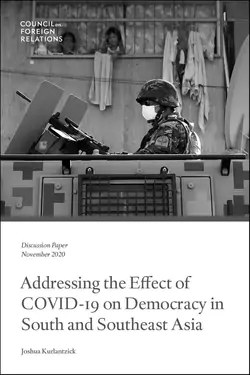
Addressing the Effect of COVID-19 on Democracy in South and Southeast Asia

To prevent further democratic regression in South and Southeast Asia, countries should continue holding elections, put time limits on emergency powers, and empower civil society to contest illiberal leaders.
- Report
Overview
South and Southeast Asia have demonstrated mixed results in combating the coronavirus pandemic, yet the COVID-19 pandemic has been a political boon for illiberal leaders. (Illiberal leaders undermine open societies and free political systems; they usually still allow elections, but they damage or outright destroy political institutions and norms and attack civil liberties.) These politicians include leaders such as Indian Prime Minister Narendra Modi, elected in free and fair elections, and more autocratic leaders such as Cambodian Prime Minister Hun Sen, whose elections have been increasingly unfree and unfair. In South and Southeast Asia, illiberal leaders, many of whom are illiberal populists, have used the pandemic as an opportunity to consolidate political and economic power, regardless of whether these actions contribute to actual public health responses.
South and Southeast Asia have had some of the most extreme COVID-19-related democratic regressions in the world. Even before the coronavirus emerged, growing political polarization, illiberal populism and sectarianism, the legacy of authoritarian rule, and the continuing influence of militaries in politics were undermining democratic politics in these regions. And combating COVID-19 does require some limitations on freedom, at least until an effective vaccine becomes available. In fact, even some longtime democracies in developed regions have struggled to balance addressing public health concerns and protecting citizens’ freedoms. Meanwhile, as news media worldwide remain focused on the pandemic, democratic regression in developing countries is receiving less attention.
More on:
The COVID-19-era consolidation of political influence should be countered to ensure that politicians cannot use the pandemic to permanently amass more power. Across South and Southeast Asia, defenders of democratic norms and institutions should support safe elections and work to ensure that, even if leaders have amassed extensive powers to fight the pandemic, these powers are time-limited and that plans for returning to political normality are in place. In countries where the number of COVID-19 cases and deaths have been relatively low, such as Malaysia and Thailand, supporters of democratic rights and institutions should use street protests, parliamentary sessions, and social media, with appropriate health precautions, to pressure governments. In states that have failed to handle COVID-19 effectively, opponents should highlight these mistakes and show that limiting political freedoms does not guarantee better public health outcomes.
External actors have a role to play as well. The United States cooperates most effectively in these regions with freer countries, and many illiberal leaders, such as the Philippines’ Rodrigo Duterte, have proved to be mercurial and difficult partners. Leading democracies, which for decades have promoted democratic change in South and Southeast Asia, should highlight flaws in the idea that authoritarian states can better address COVID-19, should support the regions’ democrats, and should push back against efforts by leading autocracies to suggest that authoritarian rulers, not democracies, are effective at fighting COVID-19.
Read this report in Indonesian
Baca laporan ini dalam bahasa Indonesia
Professors: To request an exam copy, contact [email protected]. Please include your university and course name.
More on:
Bookstores: To order bulk copies, please contact Ingram. Visit https://ipage.ingramcontent.com, call 800.937.8200, or email [email protected]. Include ISBN 978-0-87609-250-7.
 Online Store
Online Store